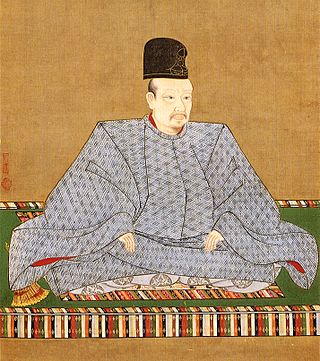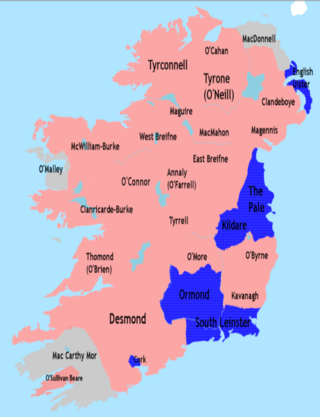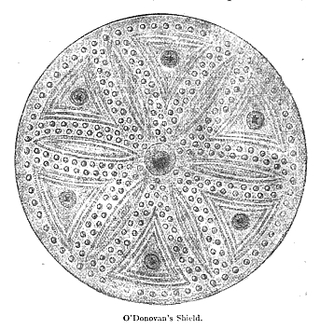
Emperor Go-Yōzei was the 107th Emperor of Japan, according to the traditional order of succession. Go-Yōzei's reign spanned the years 1586 through to his abdication in 1611, corresponding to the transition between the Azuchi–Momoyama period and the Edo period.

The Levant Company was an English chartered company formed in 1592. Elizabeth I of England approved its initial charter on 11 September 1592 when the Venice Company (1583) and the Turkey Company (1581) merged, because their charters had expired, as she was eager to maintain trade and political alliances with the Ottoman Empire. Its initial charter was good for seven years and was granted to Edward Osborne, Richard Staper, Thomas Smith and William Garrard with the purpose of regulating English trade with the Ottoman Empire and the Levant. The company remained in continuous existence until being superseded in 1825. A member of the company was known as a Turkey Merchant.

The Nine Years' War, sometimes called Tyrone's Rebellion, took place in Ireland from 1593 to 1603. It was fought between an Irish alliance—led mainly by Hugh O'Neill of Tyrone and Hugh Roe O'Donnell of Tyrconnell—against English rule in Ireland, and was a response to the ongoing Tudor conquest of Ireland. The war was fought in all parts of the country, but mainly in the northern province of Ulster. The Irish alliance won some important early victories, such as the Battle of Clontibret (1595) and the Battle of the Yellow Ford (1598), but the English won a victory against the alliance and their Spanish allies in the siege of Kinsale (1601–02). The war ended with the Treaty of Mellifont (1603). Many of the defeated northern lords left Ireland to seek support for a new uprising in the Flight of the Earls (1607), never to return. This marked the end of Gaelic Ireland and led to the Plantation of Ulster.

Arthur Chichester, 1st Baron Chichester, of Carrickfergus in Ireland, was an English administrator and soldier who served as Lord Deputy of Ireland from 1605 to 1616. He was instrumental in the development and expansion of Belfast, now Northern Ireland's capital. Several streets are named in honour of himself and his nephew and heir Arthur Chichester, 1st Earl of Donegall, including Chichester Street and the adjoining Donegall Place, site of the Belfast City Hall.
The table of years in literature is a tabular display of all years in literature for overview and quick navigation to any year.

Elisabeth of Denmark was duchess consort of Brunswick-Lüneburg as married to Duke Henry Julius of Brunswick-Lüneburg. She was regent of the Duchy of Brunswick-Lüneburg in place of her incapacitated son Frederick Ulrich, Duke of Brunswick-Lüneburg in 1616–1622.
James Hamilton, 1st Viscount Claneboye was a Scot who became owner of large tracts of land in County Down, Ireland, and founded a successful Protestant Scots settlement there several years before the Plantation of Ulster. Hamilton was able to acquire the lands as a result of his connections with King James I, for whom he had been an agent in negotiations for James to succeed Queen Elizabeth I.
Tiburzio Massaino was an Italian composer.

Donal II O'Donovan, The O'Donovan of Clann Cathail, Lord of Clancahill, was the son of Ellen O'Leary, daughter of O'Leary of Carrignacurra, and Donal of the Skins, The O'Donovan of Clann Cathail. He is most commonly referred to as Donnell O'Donevane of Castledonovan in contemporary references of his time.
The table of years in poetry is a compact directory of all "years in poetry" pages—decades and centuries prior to 1500.

Sir Thomas Smythe was an English merchant, politician and colonial administrator. He was the first governor of the East India Company and treasurer of the Virginia Company from 1609 to 1620 until enveloped by scandal.






